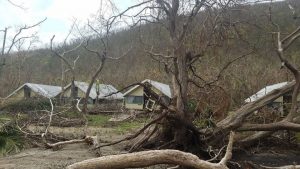By Leah Boucher – Staff Reporter
Nancy Prentiss, UMF Lecturer in Biology, has announced that the Tropical Island Ecology Course for May of 2018 will no longer take place, due to the devastation from Hurricanes Maria and Irma.
Prentiss was in the middle of planning the 13th annual trip to the island of St. John when the hurricanes hit. She knew that the trip was not possible after hearing that there had been total destruction of roads and homes throughout the Virgin Islands, but especially on St. John, where structures that had been around for hundreds of years were in complete ruins. The two hurricanes that swept through St. John left the entire island without electricity, which will likely not be restored for several months.

VIERS, although not completely destroyed, sustained damage from Hurricanes Maria and Irma.
(Photo courtesy of The Virgin Islands Environmental Research Station Facebook Page)
The Virgin Islands Environmental Resource Station (VIERS), where past UMF students have stayed for the entire 10 days on the trip, was affected by the hurricanes but still left standing.
“At VIERS, the roofs are still on the buildings, but all of the buildings got knocked off their posts,” said Prentiss. “It is likely that a high wall of water actually pushed the cabins off their posts.”
Michaela Wright, a sophomore Elementary Education major who took this course in May of 2017, distinctly remembered what initially drew her on this trip.
“When I first saw pictures of the island on a slideshow Nancy showed to students who were interested in the trip, I fell in love with the landscape and the beautiful coral reefs,” said Wright. “It’s difficult to think that the places I once visited around St. John are extremely damaged or completely destroyed.”
Ron Butler, UMF Professor of Biology and the other professor who teaches this ecology course, is hoping that despite all this damage in the Virgin Islands, VIERS will be back up and running by 2019 for another trip to take place.
“For me, St. John has a unique magic,” said Butler. “It’s hard for me to imagine finding an alternative site that would offer all of the learning opportunities for UMF students that are available in the Virgin Islands National Park, where VIERS is located.”
Although the general infrastructure of the island has been destroyed, nature on St. John has been resilient. “After the two hurricanes went through, the island was completely brown and dead looking,” said Prentiss. “Every leaf was gone, but now leaves are already coming back, and the two days of heavy rain from Hurricane Maria provided water for parched, dry land, slowly making the island look green again.”
Butler is aware that time is needed to help the island recover. He knows that more attention needs to be given to the St. John natives whose lives have been intensely altered from the two natural disasters.
“The island’s ecology will recover, but there are people who have lost their homes, their livelihoods, and in some cases – their lives.” said Butler. “With the devastation in Texas, Puerto Rico, Florida, and California, coupled with the tragedy in Las Vegas, the plight of people in the US Virgin Islands has essentially disappeared off the nation’s radar–we tend to forget that those people are American citizens, too.”
One major way people can help with recovery efforts is by directly donating money; St. John Rescue is one reputable organization on the island, where 100% of the funds go directly to helping the locals begin to recover. Prentiss believes that sending money is better than trying to go down and help right now.
“If you go down to the Virgin Islands, you become another person who needs food and water and a place to stay,” she said. “Local people may not have a place to go home to, but they are beginning to get their basic needs met.”
To donate to St. John Rescue, visit their website at www.stjohnrescue.com/donate